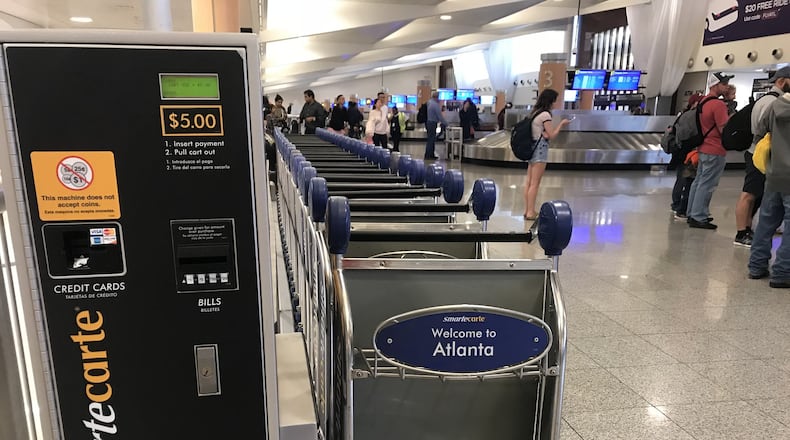A struggling contract for luggage carts at Hartsfield-Jackson International Airport is the latest example of a shrinking line of business due to technological advancements and shifting consumer patterns.
In this case, it's wheels on luggage and airline baggage fees prompting travelers to pack lighter that are causing consternation for Smarte Carte, the airport's current contractor.
“Those dynamics have caused the demand for luggage carts at airports to decline,” said Michael Multer, senior director of business development for Smarte Carte. “It hasn’t necessarily been dramatic, but it has been inexorable. It has declined at airports over time.”
VIDEO: Previous business coverage
The luggage carts cost $5 per cart at Hartsfield-Jackson. Workers for a Smarte Carte subcontractor collect the carts and return them to dispensing units. An exception is the international terminal, where carts are free, as is more common in international terminals, and provided through a different company.
The airport last year put the domestic terminal luggage cart contract out to bid, but Smarte Carte was the sole company that submitted a proposal.
That’s because “the financials of the luggage cart industry are shaky,” Multer said. The Atlanta airport sought a company to provide 1,000 new luggage carts to be placed in the domestic terminal entrances, baggage claim areas, parking decks and rental car center.
“Best case scenario, a luggage cart costs $300. So if the airport wants 1,000 of them, that’s a big capital investment,” Multer said. Smarte Carte is the market leader in luggage carts, and its competition includes smaller company Flight Services & Systems, but FSS did not compete for the Atlanta contract.
The annual rent Smarte Carte proposed to pay was less than the minimum $100,000 required, according to Hartsfield-Jackson general manager Roosevelt Council. As a result, Smarte Carte’s proposal was disqualified. Council said the airport will rebid the contract.
Meanwhile, the Smarte Carte contract, originally due to end last year, was extended with a new expiration date of June 3. But since the contracting was not successful, the Atlanta City Council finance committee voted Wednesday to extend Smarte Carte’s current contract month-to-month for up to six months while the new contract is rebid.
“We have to make a decision,” Council said. “Chances are that we probably won’t change our MAG [minimum annual guarantee for rent].”
During the contracting process, Smarte Carte raised concerns about the rent and the requirement for 1,000 carts, which it said “vastly overstates the cart demand need as well as the capacity of the system.”
It’s yet to be seen what will change when the deal is rebid, and whether any other company will compete for the contract.
“I can’t say why no one else submitted a proposal,” Council said. “I’m always surprised that people don’t submit proposals on things.”
Multer compared the decline of the luggage cart business to other services that have become obsolete.
"It's like payphones at the airport. It used to be a million-dollar source of revenue at the airport, and now they're gone," he said.
The airport has also recently struggled with contracting for an airport bank branch and ATMs as the growth of online banking and cashless payment services drives down the demand for ATMs and banks. Airports nationally face the prospect of a decline in the cash cow of parking revenue, amid the expansion of Uber and Lyft and potential for self-driving cars.
“Airports are constantly looking for increased revenue,” Multer pointed out. When a contract ends up bringing in less revenue or incurring a cost, it’s a struggle to figure out how to provide the service while stemming the loss in revenue.
Smarte Carte has branched out further into other lines of business, including lockers, baggage storage, strollers and massage chairs, shrinking the share of luggage carts to about 50 to 60 percent of the company’s business, according to Multer.
“If we look and see that our revenue from luggage carts is declining and we don’t do anything about it, then shame on us,” he said.






